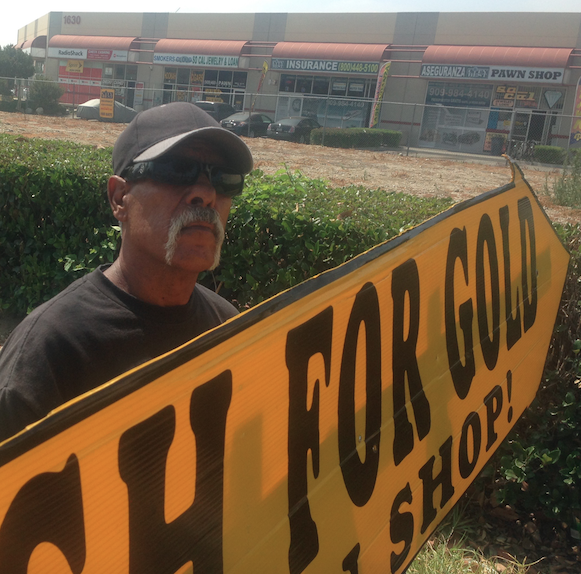 Johnny makes $10 an hour working for a small chain of pawn shops. Most days Johnny sets himself up in front of one of the shops on the main road with a big sign that says “Cash for Gold.”
Johnny makes $10 an hour working for a small chain of pawn shops. Most days Johnny sets himself up in front of one of the shops on the main road with a big sign that says “Cash for Gold.”
Johnny does other things at his job, partly to stave off boredom. “Keep it easy. Keep it simple” he says. He cleans the stores, washes the window and sweeps the sidewalk and parking lot. “But mostly,” he says, “they don’t want me cleaning up. They want me in front of this store, bouncing this sign up and down.”
Huh..
What percentage of the people driving by Johnny are actually looking to pawn some gold; 1 in 200, 1 in 500, 1 in a thousand?
Let’s say it’s 1 in 500. And even then, that one person driving by has to make the decision to stop at that shop and make the exchange. And that daily exchange has to net the pawn shop at least $80.
Can it really be worth it to spend $80 a day, $400 a week, every week, on Johnny and his sign?
But they keep employing Johnny, and he’s been there for years. So what gives?
Here’s another way to think about it. Old Aunt Nellie lives a few miles from Johnny’s professional perch. She has a lot of gold in her jewelry box. Inevitably, Aunt Nellie will pass, and someone will inherit her earthly possessions, including her gold jewelry. Someone else might get a hand me down gold chain from a major league baseball playing relative, when cousin Sluggo upgrades to celebrate his new contract. At some point in their lives, perhaps 20% or 30% of the people who drive past Johnny will have a trigger event. They’ll either come into some gold, or be in a situation where they need some quick liquidity.
When that trigger event happens, Johnny’s employer wants the lucky niece or cousin (or the unlucky person who needs quick cash now) to think of Johnny, sitting on the strip between the hedge and the sidewalk bouncing his sign on his knee. He wants to occupy just a sliver of that person’s headspace, just enough so that when they do have some gold to sell, and/or the need to sell it, they remember Johnny. They remember where they can turn their gold into cash. Johnny is not trying to attract the one person who drives by every day who needs to exchange gold for cash. Johnny is just planting the locational message again and again so everybody who drives by knows, even if they don’t know they know, where they can sell their gold.
If anyone can be your customer, advertise anywhere, and advertise enough so that you or your product occupy just enough headspace that you’ll be remembered when the trigger event happens for your potential client.
If only a fraction of the population can be your customer, don’t advertise just anywhere, but do ask yourself the question, “Where is my customer, and what’s the minimum I have to do to occupy a sliver of my potential client’s headspace; just enough so that when they have a need I can fill, they think of me?
Whatever your answer, take a cue from Johnny. Keep it easy. Keep it simple. He makes $1750 a month. His one bedroom apartment is a stone’s throw from where he works. He goes home to his rented apartment and makes himself lunch every day. (He’s saving up to buy his own place. Mr. Money Moustache would be proud.) And as he says “This is the easiest job I’ve ever had.”
And if anyone can be your customer, you can advertise anywhere.
The ideas in this post come from Tim’s book Never Be Closing.